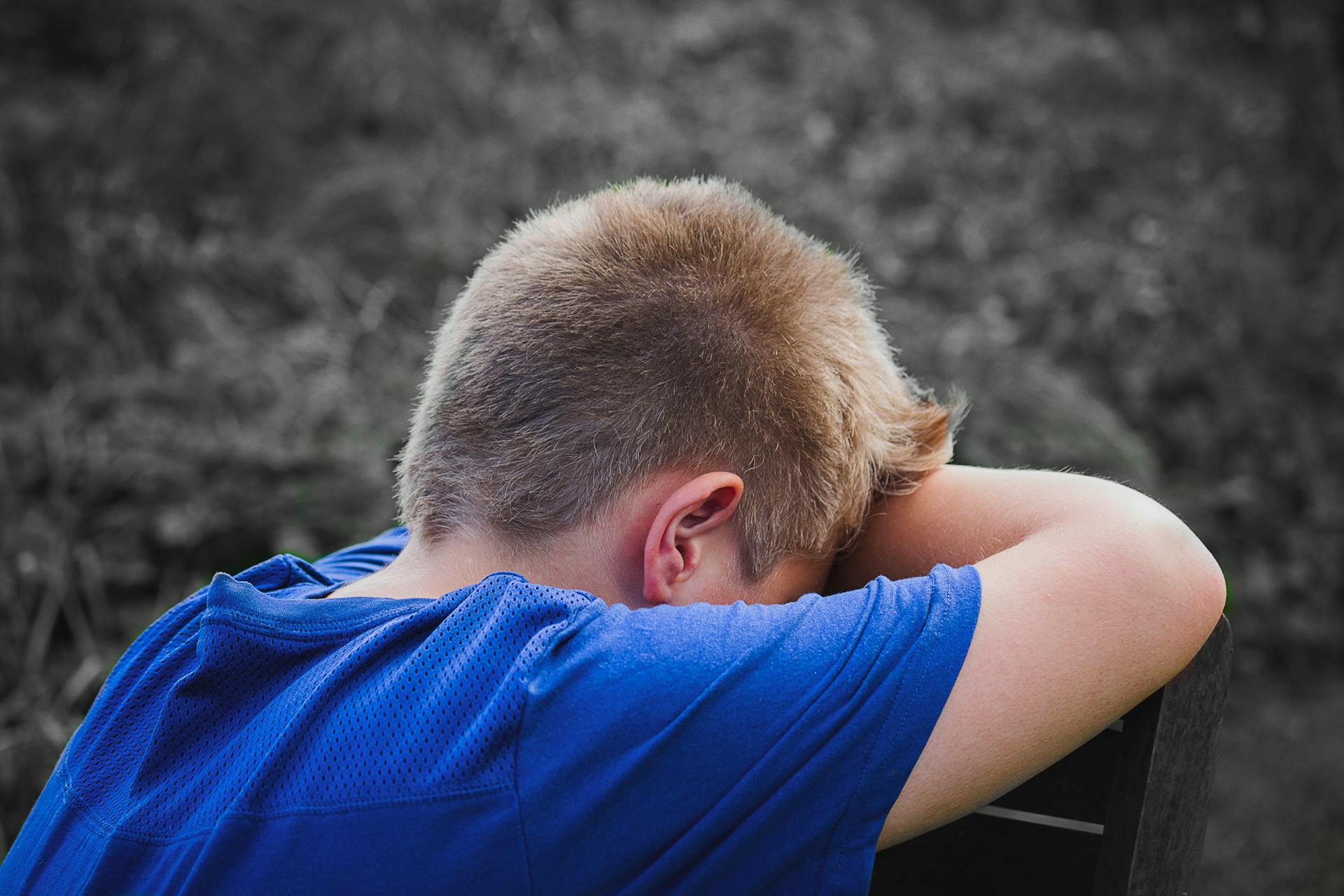
Shame is an unsavory part of the human experience that psychologists call shame. We all have something that we're ashamed of - a degree deep inside us that we try to keep hidden from the rest of the world. Shame can lead to depression, uncontrollable anger, hostility, poor physical health, and a whole range of other negative emotions.
But in recent years, self-help authors have been working hard to expose shame for what it is: an awful stuff that needs to be eliminated in order to liberate ourselves and invite super-awesome love and totally rad happiness into our lives. John Bradshaw popularized this idea in his 1988 self-help classic Healing the Shame That Binds You, and since then many other writers have taken up the shame-obliteration mantle. Deepak Chopra has even come up with some weird pseudo-scientific theories about how shame causes inflammation and falsely colored reality.
The promised land of a life without shame may seem like a distant dream, but it's possible to get there. Filmmaker Blake Edwards puts it pretty clear when he says: "The overriding point is that we all feel shame." The key is to stop the shame train when it stops by you and re-evaluate your feelings. Only by examining nuanced conclusions about why we feel shame can we eradicate it like so many dog turds on the sidewalk.
Feeling Shame and Guilt

Let's start by acknowledging the obvious: shame is one of the most universal human emotions. From small-group hunter-gatherers who've never seen a Calvin Klein underwear ad to modern large-scale societies, everyone feels shame. It's an innate part of the human experience that we can't escape.
The important difference between shame and guilt results from their triggers. Guilt arises when we feel terrible about something specific we did or failed to do, like forgetting to help a friend move or making a one-time mistake at work. In contrast, shame festers when we feel terrible about who we are as people, regardless of whether anything actually happened.
The wide-ranging implications of these two emotions make them a constant focus in self-help literature and therapy sessions alike. Shame lets us magnify our shadowy ugly parts through a magnifying glass, while guilt slowly murders us with passive aggression and overwhelming amounts of negative self-talk. The horrible truth is that both emotions shame and guilt are psychological horses with dark sides lurking beneath their seemingly innocuous exteriors.
1. 94 people had breakthroughs last week. This week, will one of them be you?
Will you be one of the 94 people who had breakthroughs last week? Perhaps, but it's important to remember that everyone's journey is different. Shame can be a powerful force that holds us back from reaching our full potential. However, by acknowledging and addressing our shame, we can begin to break free from its grip.
If you're looking for inspiration and support on your own personal journey, consider joining millions of others by subscribing to a breakthrough newsletter. Enter your email address and receive unexpected emails filled with stories of triumph over shame and practical tips for overcoming obstacles. Remember, it's never too late to make meaningful changes in your life.
Understanding the Indicators of Shame
Experiencing shame is a complex emotion that can manifest in various ways. According to psychiatrist Peter Breggin, author of the book Guilt, Shame, and Anxiety, some common indicators of shame include feeling sensitive, unappreciated or rejected regretful inadequate. Other signs may include uncontrollable blushing or feeling suspicious. When we feel shame, we may become a shrinking violet wanting to shut people out or hide away with our head hung low.
Self-defeating shame reactions can cause us to feel frozen and unable to act spontaneously. We might speak in an overly soft voice or avoid eye contact altogether. These behaviors can make it difficult for others to connect with us on a deeper level - and even lead to further feelings of shame if we aren't treated with compassion and understanding.
Despite the discomfort that comes with feelings of shame, it's important not to ignore them. Learning how to recognize the indicators of shame can help us better understand ourselves and our reactions in certain situations - ultimately leading to greater self-awareness and personal growth.
Why We Feel Ashamed: Understanding the Root Emotions
Shame is a powerful emotion that can impact our mental health and well-being. It's often created by experiences of childhood trauma or overly high standards we set for ourselves. This involves self-criticism and can lead to mental health concerns such as social anxiety disorder or other mental health disorders.
Experiencing failure can also create shame, causing us to feel inadequate or unworthy. However, it's important to note that infants experience shame naturally when they don't receive the attention they need. This is a normal part of human development and doesn't necessarily indicate future mental health concerns.
Understanding the root emotions behind our shame response is crucial in addressing this complex emotion. By recognizing how childhood experiences or societal pressures can create shame, we can begin to work through these issues and improve our mental health and overall well-being.
Actions to Take When You've Caused Someone Shame
When we hurt someone, intentionally or unintentionally, it can cause them to feel bad. If our actions have caused shame, it is important to take immediate steps to address the situation. The first step is to apologize sincerely for our behavior and acknowledge the impact it had on the other person.
In addition to apologizing, we should offer restitution where possible. Restitution might involve financial compensation if the person has suffered a financial loss because of our actions. We might also need to take specific actions to repair any damage we caused or make things right in some other way.
Finally, it's important to make amends by demonstrating that we are committed to changing our behavior going forward. This can mean seeking professional help if necessary or taking specific steps towards self-improvement. Ultimately, making amends means taking responsibility for our actions and doing everything in our power to ensure that they don't happen again in the future.
Exploring the Complex Relationship Between Shame and Guilt
Shame and guilt are two emotions that are often confused, but they are actually quite different. While guilt is a good emotion that can help us to correct bad behavior and maximize happiness, shame hurts us emotionally and can even be an emotional deterrent. When we feel ashamed, we may dislike aspects of ourselves or internalize shame for poor reasons.
However, shame helps us when breaking trust in an important relationship or when we have done something wrong like cheated rampantly on our college girlfriend. In such cases, feeling shame can help us start anew and make better choices in our current relationships. Shame has gotten a bad rap because it is often used as a form of control in strict religious sects or cultural norms.
On a relevant yup, it's funny how everybodys favorite dinner table topic narcissism is just one of the eleven types of personality disorders! A quick detour there back to the topic at hand - society shames people for things like having weird complexes over their funny nose or getting plastic surgery to change their looks. However, in a couple generations brave individuals have started to break free from these cultural norms especially in western developed societies where homosexuality was shamed for centuries before a few decades ago.
Shame informs you of an internal state of inadequacy, dishonor, or regret.

Shame is a profound and often painful emotion that can arise from various situations such as social rejection, moral transgressions, or personal failures. According to Kaja Perina, editor-in-chief of Psychology Today, shame informs us of an internal state of inadequacy, dishonor, or regret. It tells us that we have violated some standard of behavior or failed to live up to our own expectations.
When we experience shame, we tend to feel exposed, vulnerable, and worthless. We believe that others will judge us harshly and reject us based on our flaws and mistakes. Shame can be so overwhelming that it may lead to self-loathing, depression, anxiety, and even suicidal thoughts. However, it's important to remember that shame is not necessarily a bad thing since it can also signal our conscience or empathy for others.
The key to overcoming shame is to acknowledge it without getting stuck in it. We need to recognize the difference between healthy guilt (feeling bad about something we did) and toxic shame (feeling bad about who we are). By accepting ourselves with all our imperfections and learning from our failures instead of denying or hiding them, we can cultivate self-compassion and resilience. As Kaja Perina says: "Shame doesn't have to define you; it can inspire you."
1. THE BASICS
Shame is a self-conscious emotion that informs us of our internal state. It's an intense feeling of inadequacy, unworthiness, dishonor or regret that results in disconnection from positive feelings and people. Shame can be triggered by anything that makes us feel flawed, bad or unable to save face. Shame avoidance is a typical self-protective maneuver that people use to escape these painful feelings, but it often leads to more shame.
Guilt--an emotion that makes us feel remorseful and prompts us to make amends by admitting guilt--is often confused with shame, which focuses on the self as a shameful person. When we experience shame after behaving shamefully, we attack ourselves and feel weak and self-conscious. This competitive endeavor to conceal flaw and shame creates anxiety and conceals our sense of worthlessness. In my previous post, I mentioned how parents' acceptance or denial of their children's behavior can influence their experience of intense shame or guilt. Children who are physically abandoned or abused often behave in ways that provoke envy or lethal projections from peers, creating even more shame.
2. THE BASICS
Shame is a powerful and dangerous emotion that can negatively color our lives. It typically accompanies situations or comparisons that evoke envy, anger, rage, sadness, depression, depletion, or loneliness. Shame results when we transfer shame from one person to another in an attempt to make ourselves feel better. It is an all-consuming poison that can make a person ill both physically and emotionally.
Shame manages to be an emotion that is experienced without conscious thought. It can trigger anger and incite envy, stir up fantasies and rouse feelings of worthlessness. The overwhelming toxic repercussions of shame can be difficult to manage alone. It's essential to step back and examine how the emotion is affecting us before it leads us down a path of self-destruction. If you're experiencing shame or have a partner who loved one struggling with this emotion, it's crucial to seek help from a mental health professional who can guide you through the healing process towards restoring your esteemed sense of self-worth.
Coping with the Burden of Shame and Guilt
Shame is a universal emotion that we've learned to experience since childhood. It's not necessarily unhealthy, as it helps us understand when we're doing something wrong. However, when we process shame in an unhealthy way by burying emotions, it can become a heavy burden that we no longer hold.
Healthy processing of shame increases self-esteem and improves well-being. When you're ashamed, it's important to remember that people don't ridicule you as much as you think they do. The world doesn't hate you, time doesn't stop, and the sky doesn't cave in on you. These perceived failures are often exaggerated by our own minds.
One way to cope with shame is to take responsibility for your actions and make amends if necessary. Instead of obsessing over the past, focus on future actions and try to learn from your mistakes. Remember that everyone makes mistakes and that forgiving yourself is an essential part of healing. By acknowledging what happened, accepting responsibility, and moving forward constructively, you can shed the burden of shame and guilt.
1. Separate Who You Are From What You’ve Done
We've all done some stupid things in our lives, and we've all felt ashamed of ourselves. However, it’s important to remember that what we do doesn’t define who we are. Our actions may be a cautionary tale for others, but they don't make us necessarily terrible people. For example, if you accidentally killed your neighbor's cat while playing with it, it doesn't mean that you're a cat-murderer destroyer.
It's essential to realize that everyone goes through similar struggles and makes mistakes. We need to learn from those mistakes and move on without beating ourselves up over them. Remember, separating who you are from what you've done is crucial for your mental health and overall well-being.
2. Empathize With the Real Motivation Behind Your Actions
Empathizing with the real motivation behind your actions is a crucial step in understanding and dealing with shame. It's easy to get caught up in feelings of guilt and regret, but it's important to take a step back and examine what led you to act in a certain way. Maybe you've separated from your partner, and you're feeling like a terrible human being for doing so. But if you take the time to reflect, you might realize that the real reasons behind your decision were more complex than simply wanting out.
Perhaps it was because you've felt underappreciated for years, or because you hadn't slept properly in weeks due to stress from work projects. Maybe there were other factors at play that even you weren't fully aware of. By taking the time to understand these motivations, you can move forward without condemning yourself for something that wasn't entirely within your control. You didn't torpedo the relationship out of spite or malice - it was a culmination of many different factors, some of which were outside of your control.
Empathy goes both ways - not only should you try to understand your own motivations, but also those of others around you. When a good friend fucks up or makes a colossal screw up, instead of jumping straight to condemnation, try to put yourself in their shoes and think about what might have led them to act in such a way. By doing so, you'll give them the same grace and understanding that you would hope for when faced with similar circumstances. Ultimately, empathy can be one of the most powerful tools we have when dealing with shame and guilt - both towards ourselves and others around us.
3. Do Better Next Time
When we experience feelings of guilt or shame, it can be tempting to push them aside and try to forget about them. However, these emotions can actually be strong motivators for change in the future. While they may feel like a totally unpleasant kind of discomfort, they can also provide valuable insight into our values and priorities.
Instead of avoiding guilty feelings or future shame, it’s important to embrace them as opportunities for growth. By reflecting on our behavior and identifying areas where we could have done better, we can make a plan for how to handle similar situations in the future. This kind of self-reflection can not only help us avoid repeating mistakes but also enable us to live more intentionally and in alignment with our values. So don't shy away from shameful experiences, use them as a tool for improvement!
4. Share Your Shame Even If—Wait, No—Especially If It Hurts
Expressing shame is not an easy thing to do. We often feel embarrassed and vulnerable when we reveal our deepest secrets, fears, and insecurities to others. However, the counterintuitive part is that sharing our shame can actually strengthen our relationships with others. It may sound crazy, but it's true. When we share our feelings of shame with a good friend or loved one, they are more likely to empathize with us and offer support.
I remember a Friday night when I was sobbing quietly in my room. I hadn't talked to anyone about what was bothering me because I felt ashamed of my situation. But eventually, I reached out to a friend and shared my feelings of embarrassment with her. She listened without judgment and reminded me that everyone goes through tough times. That night became the foundation for one of my strongest relationships because trust was inevitably built between us. So don't be afraid to share your shame—even if it hurts—because the core benefit is worth it in the end.
Worth a look: Cognitive Biases That Hurt Relationships
5. Choose Your Shame, Choose Your Values
Shame is a complex emotion that can teach us important lessons about our values and behaviors. While guilt can teach us when we've done something wrong, unhealthy shame can make us feel awful about who we are as people. However, experiencing healthy shame can be a good indication that we have values that we care about and want to live up to. Shame helps us have honest conversations with ourselves and others, but ultimately manipulative shame infects our relationships and interferes with our well-being.
Values determine whether shames is good or bad - good values produce good, healthy shame while bad values produce self-loathing mess. Bradshaw refers to himself as a "shame zealot," and Deepak Chopra has written extensively on the neurological review of self-conscious emotions and brain correlates. The Self-Conscious Emotions Theory explains how underlying appraisals influence the experience of shame, guilt, embarrassment, and other self-conscious emotions. It also suggests that individual differences in emotion regulation processes have implications for affective relationships and well-being. By expanding awareness through tools like the Feeling Wheel or Emotional Balance Sheet, we can manage shame as a manageable emotion in day-to-day living - thereby increasing spontaneity and emotional balance.
It's important to note that circumstances evoking pride or cultural shame issues often strongly correlate with feeling shame or anger - depending on varying levels of grandiose narcissism versus vulnerable narcissism (justifications included). Studies on emotional disclosure in personal relationships (e.g., Cambridge Handbook), nonverbal signals affecting shame interpersonal behavior psychopathology (Andrews et al., 2010), gay rights/cultural shame issues (Al & Whats Moral?, 2007), cognitive development/childs theory of basic emotions (Fischer Eds Self-Conscious Emotions/MIT Press Series), or even orbitofrontal damage journal entries all illustrate different entry points into the complexities surrounding this topic.
6. Wait! Here Are 3 Ideas That Could Change Your Life
Shame can be a debilitating emotion that keeps you stuck in a cycle of negative self-talk and self-doubt. But there are ways to break free from shame and embrace a more fulfilling life. One idea is to challenge the beliefs that fuel your shame. Often, these beliefs are based on outdated or irrational thinking patterns that hold you back from reaching your full potential.
Another idea is to shift your focus away from yourself and towards others. Helping others can give you a sense of purpose and meaning, which can help alleviate feelings of shame and depression. And finally, it's important to remember that you're not alone in your struggles with shame. Many important philosophers have lived and read about this topic extensively, offering valuable insights into how to overcome it.
If you're interested in learning more about overcoming shame, be sure to check out our free 19-page ebook on the topic! With practical tips and tools for breaking free from negative self-talk and embracing a more fulfilling life, this resource could be just what you need to start living as your best self.
Detecting Shame: A Guide to Recognizing the Emotion

Shame is a complex and often difficult emotion to detect in others. People who feel ashamed may exhibit a range of behaviors that can be hard to interpret, but there are some key signs you can look out for. One common indication of shame is an overly loud voice or aggressive manner. This may be an attempt to cover up feelings of embarrassment or inadequacy.
Another sign of shame is trouble recognizing eye contact. People who are ashamed may avoid looking at others, as they fear being judged or rejected. Conversely, others may make intense eye contact as a way of asserting themselves and hiding their shame. Additionally, people who have experienced shaming in the past may be more likely to recognize shaming behavior in others.
It's important to remember that shame is not the same as guilt or remorse. While guilt is focused on one's actions, shame relates to one's sense of self-worth. People who feel ashamed may believe that they are fundamentally flawed or unworthy, which can lead them to engage in unacceptable behavior like making fun of others or acting out in an assertive manner. By understanding these behaviors and learning how to recognize shame when it occurs, we can create more supportive environments and foster greater empathy and understanding between individuals.
Are Shame and Guilt the Keys to Civilization?
It's a sad fact of human existence that we're flawed beings. We all have the capacity to do things that are harmful or destructive, whether it's stealing someone else's car, selling crack on the street corner, or deciding to ski naked down a busy mountain slope. Life without social norms would be a chaotic mess. Yet at the same time, there is an inherent tension between our desire for individual freedom and our need to live in a functional society.
Social norms drive much of our behavior from a very young age. We learn what's expected of us by watching others around us and by experiencing shame or guilt when we don't follow those expectations. These simple practices require bits of ourselves that we don't always feel like giving: wearing clothes we don't particularly like, showing up on time when our friend bails on us, or being polite to people who annoy us. But they serve a greater good in helping inspire people to behave in ways that benefit everyone.
Shame and guilt can be powerful tools to convince people to act in ways that support the greater good. They can help us create functional societies where compromise is possible and everyone has a chance to thrive. So while it may not be accurate to say that shame and guilt are the keys to civilization, they certainly play an important role in creating the social norms that make civilized life possible.
Frequently Asked Questions
Is shame a dangerous emotion?
Shame can be a dangerous emotion as it can lead to negative thoughts, low self-esteem, and even depression. However, it can also be a motivator for personal growth and improvement if managed appropriately through therapy or self-reflection.
How can I let go of shame?
To let go of shame, start by identifying the trigger and accepting your feelings. Practice self-compassion, challenge your negative beliefs, and seek support from loved ones or a therapist.
How to let go of shame?
To let go of shame, start by acknowledging and accepting your feelings. Then, practice self-compassion and forgiveness, surround yourself with supportive people, and focus on positive affirmations and actions to move forward.
How to conquer shame?
One way to overcome shame is to practice self-compassion and focus on your positive qualities. It can also be helpful to talk about your feelings with a trusted friend or therapist.
Is shame toxic to children?
Yes, shame can be toxic to children as it can lead to feelings of unworthiness and low self-esteem. It can also have long-lasting effects on their mental health and well-being.
Featured Images: pexels.com


